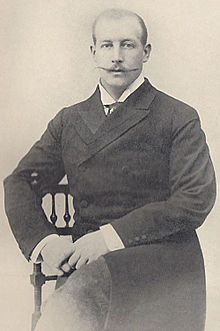George of Greece
George, Prince of Greece and Denmark - gr. Γεώργιος της Ελλάδας / Georgios tis Elladas - (born June 12 . Jul / 24. June 1869 greg. In Mon Repos on Corfu , Kingdom of Greece ; † 25. November 1957 in Saint- Cloud , Hauts-de-Seine department , France ) from the house of Schleswig-Holstein-Sonderburg-Glücksburg was a member of the Greek royal family .
Between 1898 and 1906 he was High Commissioner of the Cretan State .
Life
Prince Georg was born on June 24, 1869 in Mon Repos Castle on the island of Corfu. He was the second-born son of the Greek King George I and his wife, the Russian Grand Duchess Olga Konstantinovna Romanova . As the grandson of the Danish King Christian IX. ( “Europe's father-in-law” ) and as the great-grandson of Russian Tsar Nicholas I, there were close family ties to both the Danish and the Russian ruling houses.
In 1883 Georg began training as a naval officer at the Danish Naval Academy and from then on lived at the court of his uncle Prince Waldemar at Bernstorff Castle near Copenhagen . At the end of his training, in 1890/91 he accompanied his cousin, the Russian heir to the throne Nicholas , on board the tank frigate Pamjat Asowa on a journey of several months to East Asia. During this trip, Georg thwarted an attempted assassination on Nikolaus in Japan on May 11, 1891 ( Ōtsu incident ).
At the side of his brothers Konstantin and Nikolaus, Georg helped organize the Olympic Summer Games in Athens in 1896 . Because of his experience as a naval officer, Georg became a member of the Olympic Committee and chairman of the sub-committee for nautical sports.
After the outbreak of the Turkish-Greek War in February 1897, Georg commanded a landing company for Greek troops on the island of Crete . Despite the military victory of the Ottoman Empire , Crete was given extensive autonomy under pressure from the major European powers and was declared an international protectorate . By a joint decision of the great powers Georg was appointed High Commissioner of the Cretan State on December 9, 1898 . In the dispute about the future membership of Crete in the Kingdom of Greece , there were persistent disputes with the political opposition to Eleftherios Venizelos , whereupon Georg submitted his resignation as high commissioner on September 12, 1906.
Due to ongoing economic problems ( national bankruptcy in 1893 ) and the defeat in the Turkish-Greek War of 1897, the royal princes were removed from their leadership positions under pressure from revolutionary officers in 1909 ( Goudi revolt ). From then on Georg lived with his wife in Paris . Only after the outbreak of the First Balkan War in October 1912 did Georg return to Greece and serve his father with the rank of admiral as a wing adjutant . After his murder on March 18, 1913, Georg's older brother Constantine I ascended the throne.
When the First World War broke out , Georg lived again in Paris and, due to his diplomatic contacts, acted as the unofficial Greek ambassador. In the 1920s, during the republican interlude, Georg gave refuge to members of the Greek royal family who had fled because of his wife's financial means. For example, his nephew Prince Philip , who later became the Duke of Edinburgh, lived with his parents at times in his uncle's household.
As a result of the occupation of France by the German Wehrmacht , Georg returned to Greece in February 1941, but had to flee after the German invasion of Greece and came via Crete and Egypt to South Africa , which granted him admission in July 1941. Georg did not return to Europe until November 1944, first to London and in early 1945 to Paris. Georg attended official appointments for his nephew, King Paul of Greece , and traveled to his homeland despite the civil war .
Prince Georg died on November 25, 1957 in Saint-Cloud near Paris. As requested, his remains were transferred to Greece and buried on December 4th in the Royal Cemetery of Tatoi .
Marriage and offspring
On November 21, 1907, Georg married Marie Bonaparte , daughter of Roland Bonaparte and Marie-Félix Blanc in Paris . An Orthodox ceremony followed in Athens on December 12th. The marriage resulted in two offspring:
- Prince Petros (1908–1980) ∞ Irina Alexandrovna Ovchinnikova
- Princess Evgenia (1910–1989) ∞ Dominik Prince Radziwiłł (1st marriage); ∞ Don Raymund Principe della Torre e Tasso , 2nd Duca di Castel Duino (2nd marriage). This marriage was divorced on February 27, 1946 and church annulled on December 18, 1952.
Web links
- ANNO , Die Presse, June 26, 1869, page 5, column 3
- Oldenburg line: Danish royal family
| personal data | |
|---|---|
| SURNAME | George of Greece |
| ALTERNATIVE NAMES | Greece, Georg Prince of (full name) |
| BRIEF DESCRIPTION | High Commissioner of Crete |
| DATE OF BIRTH | June 24, 1869 |
| PLACE OF BIRTH | Corfu |
| DATE OF DEATH | November 25, 1957 |
| Place of death | Saint-Cloud |

